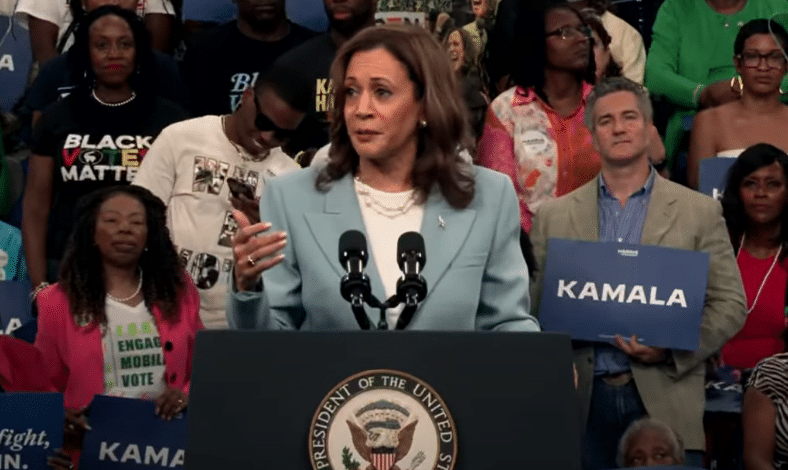July 31, 2024
Permission to republish original opeds and cartoons granted.
More Americans ‘Never’ Agree With Kamala Harris On Most Political Issues, So Conservatives Should Focus Exposing Her Radical Ideology

By Manzanita Miller
As predicted, beltway Democrats and their mouthpieces in the mainstream media are being swept away with Kamala Harris fever, delighted at last to have candidate who can string full sentences together. Democrats can finally expel a great sigh of relief that their offering for president isn’t Joe Biden.
After Biden’s withdrawal from the race and Harris’ rapid entry into the fray as the presumptive Democratic nominee, her approval rating began to rise, buoyed by deep pocketed special interests. According to the latest Wall Street Journal poll, Harris has erased most of former President Donald Trump’s lead over Biden, trailing Trump by just two percentage points.
The New York Times reported in their latest Times/Siena poll that Harris is trailing Trump by a single percentage point among likely voters. Harris has also enjoyed a bump in her approval rating among the public – from 36 percent in February to 46 percent late last week.
Harris is also making up ground with traditionally Democratic groups that had been scaling back their support for Biden for well over a year – namely young voters and minorities. Keep in mind that for over a year now, Biden has polled around 20 to 30 percentage points below his 2020 exit poll numbers with these groups. Harris making up ground with these voters is notable, but it may take more than a small bounce to regain the support Biden lost.
Is Harris more popular than Biden was a month ago? Arguably by a slim margin, but that could be short lived. The party is relieved to have replaced Biden, and the mainstream media is rallying around her. Polls conducted now are a snapshot in time during the Harris honeymoon period. However, poll after poll shows that on real issues, Americans largely disagree with and distrust Harris’ ideology and governing record.
This is a key finding that conservatives should not dismiss. Conservatives would do best to avoid the Harris campaign’s attempt to frame the election as one based on either personality or “prosecuting” the former president. The reality is a vast majority of the public favor Trump’s governing record on nearly every major political issue from the economy to immigration to Israel. However, there are large swathes of undecided voters still.
A new YouGov poll shows that a majority of Americans say they “never” agree with Kamala Harris on major political issues. Very few Americans say they “always” or “usually” agree with Harris on the issues, and sizeable shares of the country say they do not know.
Take the economy. The largest share of voters (27 percent) say they “never” agree with Harris on the economy, while 12 percent say they “rarely” agree with her on the economy. Only 12 percent of the public claim to “always” agree with Harris on the economy and 15 percent say they “usually” agree with her.
This combines to 39 percent of the country saying they “never” or “rarely” agree with Harris on the economy and 27 percent who say they “always” or “usually” agree with her. By a twelve-point margin, Americans do not agree with Harris on the economy.
Immigration, an issue that has become increasingly critical to this election, perhaps even more so than it was in 2016, Harris’ numbers could not be worse. Thirty-two percent of the country “never” agrees with Harris on immigration while 10 percent rarely agree with her, indicating a full 42 percent of Americans disagree with Harris on the border. How many agree? Ten percent of Americans say they “always” agree with Harris on the border while 14 percent say they “usually” agree with her. This amounts to less than a quarter of the public (24 percent) saying they agree with Harris on the border. By an eighteen-point margin – 42 percent to 24 percent – Americans disagree with Harris on the border.
How about on the Israeli-Palestinian conflict? Here, once again, Harris’ numbers are dismal. Thirty-two percent of Americans assert they “never” agree with Harris on Israel, while 10 percent say they rarely do, amounting to 42 percent of the country who disagree with her. A mere eight percent of the public agrees with Harris on Israel “always” while twelve percent agree with her “usually”. This means that by a twenty-two-point margin, Americans disagree with Harris on Israel.
On every single issue except for abortion, the share of Americans who “always” agree with Harris is less than 15 percent. In contrast, on every single issue, the share of Americans who say they “always” agree with Trump exceeds 15 percent.
For instance, a full 34 percent of voters “always” agree with Trump on immigration, 29 percent “always” agree with Trump on the economy, 26 percent “always” agree with Trump on crime, 21 percent “always” agree with Trump on Israel, seventeen percent “always” agree with Trump on both Ukraine and the environment, and 15 percent “always” agree with Trump on abortion.
Combining the share of Americans who “usually” or “always” agree with Trump on each issue, Former President Trump enjoys wide margins over Harris. On immigration, 45 percent of the country “always” or “usually” agree with Trump, giving him a twenty-one-point lead over Harris on immigration.
On the economy, 43 percent of Americans “usually” or “always” agree with Trump, giving him a sixteen-point lead over Harris on the economy.
On the Israeli-Palestinian conflict, 35 percent of Americans “usually” or “always” side with Trump, giving him a fifteen-point lead over Harris on Israel.
On crime, 41 percent of Americans “usually” or “always” agree with Trump, giving him a fourteen-point lead over Harris on crime.
Even on the environment, Americans narrowly agree with Trump over Harris by a slim two-point margin, 34 percent to 32 percent.
On one issue, a greater share of the American people agrees with Harris over Trump – abortion. Even then, there are strong dissenters. By eight points – 39 percent to 31 percent – Americans “usually” or “always” agree with Harris over Trump on abortion, but a full 28 percent say they never agree with Harris.
It is safe to say that on many of the top issues facing the country, Americans who have their opinions made up already side more with Trump than Harris. That said, between 16 percent of the public – on abortion – and 28 percent of the public – on both crime and Israel – remain undecided about who they agree more with. This means that around a quarter of the public is persuadable on these key issues, and this is where Democrats will likely attempt to strike and portray Harris in a manner that is palatable to swing voters.
Which groups are more likely to be represented among the persuadable? Young people, women, and minorities are ground zero for persuadable voters.
For example, a full 30 percent of women compared to 15 percent of men “aren’t sure” if they align with Harris on immigration yet. Likewise, 28 percent of voters under 30 compared to 15 percent of voters over 65 “aren’t sure” if they align with Harris on immigration. And 29 percent of Black voters as well as 24 percent of Hispanics “aren’t sure” whether they align with Harris on immigration compared to 22 percent of whites.
Conservatives can take heart that on nearly every political issue, the American people largely side with Trump over Harris as it stands now. However, they must not become complacent about that persuadable share of the public in the middle.
Manzanita Miller is the senior political analyst at Americans for Limited Government Foundation.
Lame Duck Biden’s Supreme Court Term Limits Legislation Would Upend ‘Good Behavior’ Constitutional Standard Of Lifetime Tenure

By Robert Romano
In his waning days in office, lame duck President Joe Biden on July 29 has proposed that Supreme Court justices be given 18-year term limits thus ending the current lifetime tenure of the nation’s highest court.
Biden stated, “The bipartisan commission I convened analyzed various term limit structures. Based on their report, I believe the best structure is the 18-year term limit. That would help ensure the country would not have what it has now: an extreme court that’s the product of an attack on the confirmation process that’s been… weaponized by those seeking to carry out an extreme agenda for decades to come.”
There’s just one problem, which at least some of the members of the commission were well aware of, is that such a plan if enacted by Congress would be wholly unconstitutional, and thus, could only be done by a constitutional amendment, which Biden failed to mention. Perhaps because other members of the commission thought that Congress should just go ahead and do it anyway.
According to the commission, “Members of the Commission are divided about whether Congress has the power under the Constitution to create the equivalent of term limits by statute. Some believe that a statutory solution is within Congress’s powers. Others believe that no statutory solution is constitutional…” Why?
This was elaborated on, with the commission stating, “Opponents point to the Constitution’s provision that judges serve for ‘good Behaviour,’ which they regard as providing for life tenure, as one of only two express protections of judicial independence.”
The provision in question is Article III, Sec. 1 of the U.S. Constitution, which states, “The judicial Power of the United States, shall be vested in one supreme Court, and in such inferior Courts as the Congress may from time to time ordain and establish. The Judges, both of the supreme and inferior Courts, shall hold their Offices during good Behaviour…”
So, judges and justices could presumably be impeached for bad behavior, or they might resign, or they could die in office, but they cannot have term limits under the constitutional scheme.
That this is widely accepted is beyond question, but it was explicitly stated by the Framers including Alexander Hamilton in the Federalist No. 78, when he wrote, “with regard to the judges, who, if they behave properly, will be secured in their places for life…”
And why? Hamilton says an independent judiciary is designed explicitly to protect minority rights in the republic: “This independence of the judges is equally requisite to guard the Constitution and the rights of individuals from the effects of those ill humors, which the arts of designing men, or the influence of particular conjunctures, sometimes disseminate among the people themselves, and which, though they speedily give place to better information, and more deliberate reflection, have a tendency, in the meantime, to occasion dangerous innovations in the government, and serious oppressions of the minor party in the community.”
Even Congress.gov’s webmaster is well aware of this fact, with its explanation of Article III, Section 1 stating, “Article III, Section 1 provides that federal judges hold their offices during good behavior. This standard, borrowed from English law, ensures that federal judges hold their seats for life, rather than set terms or at the will of a superior.”
And why? Congress.gov instructs, “the Good Behavior Clause protects federal judges from removal for congressional disagreement with legal or political opinions.”
The idea was to establish an independent judiciary that would not be concerned with whether their opinions would be widely popular, and would focus their energies on simply adhering to the Constitution and the laws made pursuant to it. This is standard civics that we teach to children.
Biden has also supported packing the Supreme Court beyond its current nine justices so that it delivers the opinions that he and his party agree with. Prior generations and electoral fortune had resulted in liberal majority in past decades, but now power has shifted, with Republicans having appointed six of the nine current justices.
So, Biden’s plan, term limits, packing the court plus his proposal for a legal code of conduct for the Supreme Court — an attempt to water down “good behavior” beyond crimes and misdemeanors — is to deconstruct the carefully laid plan of the Framers so as to politicize the judiciary. They’d need to consider whether their opinions might get them kicked off the court.
This would permanently damage the separation of powers and making courts little more than rubber stamps for an oppressive majority, since opinions that apply constitutional limits to the exercise of power by Congress, the President and the states could later become grounds for removal.
A great example is the Supreme Court’s recent decision limiting the power of the executive, judiciary and the states to prosecute former presidents for official acts — but notably not for unofficial acts — taken while in office.
Here, Biden wants a constitutional amendment so that signing a bill into law or making an appointment or another constitutional or official act could later be declared to be a crime by federal and state prosecutors. The Court decided that in essence the executive cannot prosecute itself for official acts, not because doing so was popular, but because the decision was essential to the separation of powers.
The Supreme Court and lower courts need that latitude to maintain the constitutional balance, to in the words of Marbury v. Madison, to “say what the law is.” The moment justices and judges can no longer do that without fear of reprisal is the moment a very critical safeguard for limited government and the rule of law vanish before our eyes. Be careful what you wish for.
Robert Romano is the Vice President of Public Policy at Americans for Limited Government Foundation.

